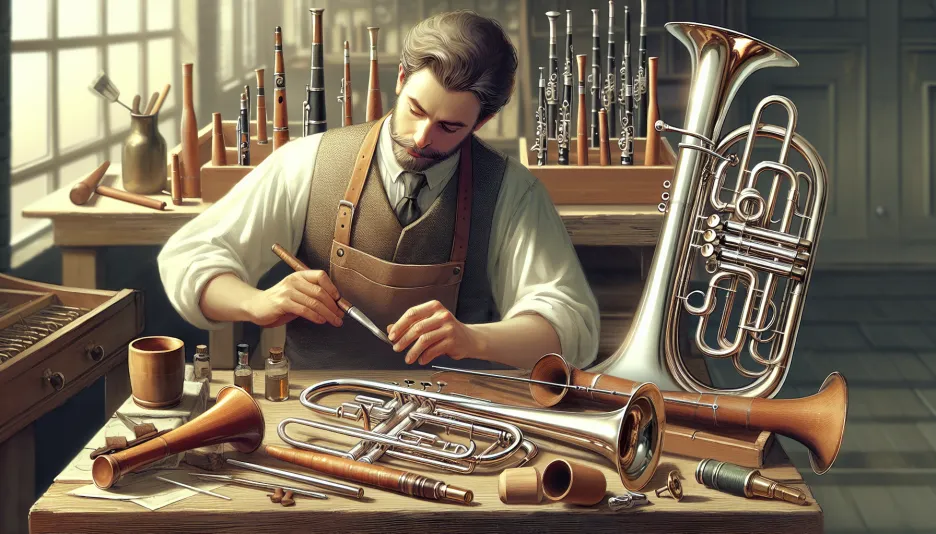- Salary statistics
- Wind instrument maker
Wind instrument maker salary
34 538 - 34 662 kr / month
Women earn 24758% of what men do.
Hantverksyrken
Salary progression Wind instrument maker

Introduction to Brass Instrument Maker
When thinking about musical instruments, it is easy to forget about the specialized craftsmen behind their creation. A Brass Instrument Maker is one such professional who creates, repairs, and maintains brass instruments, including everything from trumpets and trombones to clarinets and flutes.
Job Duties and Responsibilities
As a Brass Instrument Maker, you primarily work on manufacturing and repairing brass instruments. This requires a deep understanding of materials such as metal and wood, along with a sense of acoustics. Many instrument makers specialize in a particular type of instrument, making them experts in their field. Duties may also include adjustments, tuning, and customization of instruments to enhance their sound quality.
Brass Instrument Maker Salary
It is always interesting to know what a Brass Instrument Maker earns. Currently, the average salary for this profession is 34 662 kronor per month. This represents a marginal increase from previous measurements, where the average salary was 34 382 kronor. For those working on an hourly basis, the hourly wage is around 208 kronor, based on an average working month of 166 hours.
Salary Disparities and Gender Equality
Unfortunately, we do not have specific statistics on salaries for men and women in this profession. What we do know is that women earn 24 758 percent of what men do, which is a clear discrepancy and should be further investigated. This suggests that there may be a bias or inaccuracy in the available data.
Education and Requirements
To become a Brass Instrument Maker, a typical requirement is education in musical instrument making or a related craft. There are vocational schools and training programs that offer specialized courses in this area. The education combines theoretical knowledge with practical skills, often including an internship with an experienced instrument maker.
Future Outlook and Challenges
The profession of a Brass Instrument Maker is niche but has a stable demand, especially among professional musicians and orchestras. However, finding employment directly after education can be challenging, as many craftsmen work as self-employed individuals. A strong network and a good portfolio of previous works can be crucial to succeed in the industry.
Competition and Working Conditions
Competition in the profession can be tough, particularly because it is a craft where quality and precision are highly valued. Working conditions can vary depending on whether you work in a workshop, from home, or in a larger company. There are few benefits such as paid training or the opportunity to work from home in this profession, which means that you often have to invest in your own development.
Key Considerations
Working as a Brass Instrument Maker requires a great deal of passion for music and craftsmanship. It is a profession that rewards precision and creativity, but it can also be demanding with a lot of time devoted to detailed and meticulous material processing. For those who love music and have a knack for craftsmanship, this is a profession with many rewards.
- Specializing in a specific instrument can enhance job opportunities.
- Building a network within the music industry is important.
- Staying updated on new techniques and materials is crucial.
- Expect to work as a self-employed individual or freelancer.
Becoming a Brass Instrument Maker involves combining art and science, handling both traditional and modern techniques, and always striving for the perfect sound. It is a profession for those who are passionate about music and who want to contribute to the world of music in a very tangible way.
Salary distributed by age and sector
About the data
All information displayed on this page is based on data from the Swedish Central Bureau of Statistics (SCB), the Swedish Tax Agency and the Swedish employment agency. Learn more about our data and data sources here.
All figures are gross salaries, meaning salaries before tax. The average salary, or mean salary, is calculated by adding up the total salary for all individuals within the profession and dividing it by the number of individuals. For specific job categories, we have also considered various criteria such as experience and education.
Profession Wind instrument maker has the SSYK code 7319, which we use to match against the SCB database to obtain the latest salary statistics.
-

Musical instrument makers and other artisans
-

Seamstresses
-

Seamstresses
-

Musical instrument makers and other artisans
-

Tailors and atelier seamstresses etc.
-

Musical instrument makers and other artisans
-
 Electricity prices
Electricity pricesElectricity Prices in Sweden: Free Electricity and Economic Tips
Sun, 24 Nov 2024 - 13:01 -
 Municipality
MunicipalityTax Pressure in Kiruna Municipality - An Overview of Tax Rates and Economic Challenges
Thu, 23 May 2024 - 22:26





